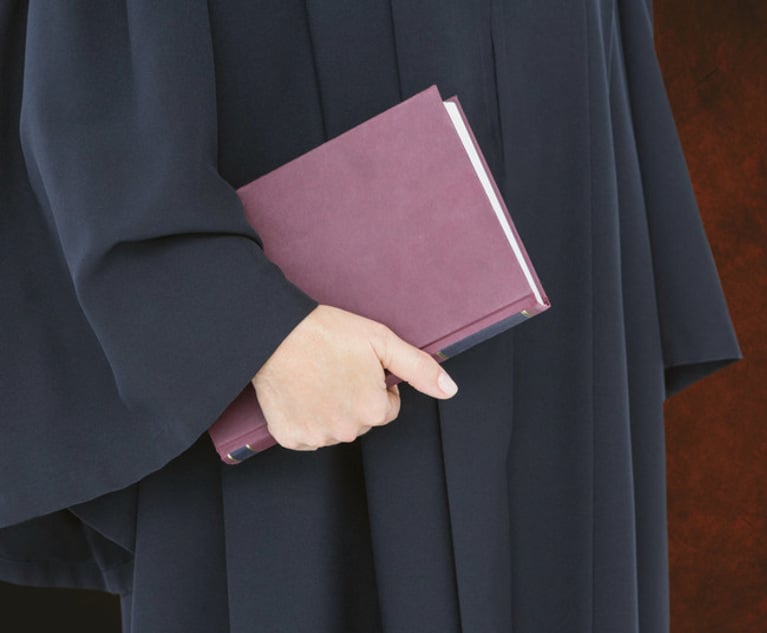State Supreme Court Grapples With Judicial Immunity for Former Judge
Three Georgia Court of Appeals judges, including the chief, joined with six state Supreme Court justices in a case asking them to reverse their appellate colleagues and restore immunity to the former chief judge of DeKalb County's problematic—and defunct—Recorders Court.
May 07, 2018 at 03:51 PM
5 minute read

The Supreme Court of Georgia was urged Monday to reverse a state Court of Appeals ruling that stripped the former judge of DeKalb County's now defunct Recorders Court of immunity in a civil case.
That former judge, Nelly Withers, and her court administrator, Troy Thompson, urged the high court to reinstate Withers' immunity from litigation brought by former defendant Bobby Schroeder, who had been ticketed for a traffic infraction.
The case has attracted the attention—and alarm—of the state councils of superior court, state court and magistrate judges. The organizations filed friend-of-the-court briefs backing Withers even though her operation of Recorders Court was so problematic that the Georgia General Assembly abolished it in 2015.
Withers' court was the target of a string of lawsuits questioning its operations, including allegations it was illegally adjudicating cases over which it had no jurisdiction.
When the Legislature created four new state court judgeships in 2015 to handle traffic citations and ordinance violations that had been the purview of Recorders Court, Withers was not appointed to fill one of the posts.
The judges' associations contend the 2017 Court of Appeals ruling, if allowed to stand, “would require judges and court personnel to defend against all lawsuits alleging negligent management, supervision and training of personnel” and would likely have “significant, negative repercussions on the courts.”
On Monday, in a notable twist, three state Court of Appeals judges—Chief Judge Stephen Dillard, Amanda Mercier and Clyde Reese III—stood in for Justices Nels Peterson, Carol Hunstein and Chief Justice Harris Hines to hear Withers' appeal.
The appellate judges will join with the high court's six other justices—David Nahmias, Harold Melton, Keith Blackwell, Michael Boggs, Britt Grant and Robert Benham—in reviewing whether to reverse an opinion written by their appellate colleagues Christopher McFadden, Charles Bethel and Elizabeth “Lisa” Branch, who was recently elevated to the U.S. Court of Appeals for the Eleventh Circuit.
McFadden, writing for the panel last year, reversed a DeKalb County Superior Court judge who dismissed the case.
McFadden's opinion held that, while judicial immunity may shield judges from suits stemming from actions they perform in their judicial capacity, it does not extend to administrative actions such as supervising court employees and overseeing the efficient operation of a court.
The appellate panel was also persuaded by Schroeder's counsel, David Ates, who argued that, because Withers and Thompson were negligent in executing specific administrative duties, they were not immune from liability. Ates died shortly after the opinion was handed down, and Schroeder is now represented by Harlan Miller and Gerard Lupa.
The appellate panel also reinstated Schroeder's civil rights claims over allegations he was illegally jailed because Withers and Thompson oversaw a dysfunctional court operation that they knew was understaffed, underfunded and routinely transmitted inaccurate information to the state.
Although Schroeder appeared in court and paid his fine, court personnel notified the state Department of Driver Services that his driver's license should be suspended because he had not shown up in court and never paid his ticket.
The subsequent suspension of Schroeder's license led to two more traffic stops, revocation proceedings of his probation as a first offender, a month-long sojourn in jail, the loss of his job and the repossession of his car before court personnel belatedly corrected the error.
On Monday, attorney Thomas Mitchell of Carothers & Mitchell claimed Schroeder's counsel had not pointed to specific official acts or duties that Withers or Thompson negligently failed to perform. The case was tossed out on a motion to dismiss prior to any discovery.
Justice David Nahmias pointed out that Mitchell was relying on cases that had been decided on motions for summary judgment after discovery. He asked how anyone would know so early in the litigation whether the county or the court had a policy laying out specific duties for the court administrator that would ensure that license suspensions were properly processed—policies that he may have violated.
Nahmias also said Mitchell's argument suggested he was seeking a rule that supervision and training responsibilities by an agency head were shielded by immunity, and that a defendant challenging those practices had no case.
“You don't get discovery, you don't get anything?” he asked. “If you allege ministerial dysfunction, you lose.”
“When you are talking about a chief judge and court administrator, that has to be the rule,” Mitchell said.
Justice Robert Benham asked if that meant litigants would have no recourse if the court bought Mitchell's argument.
“For the clerks themselves, they are supposed to do this. It appears to be ministerial duty” that would include immunity from liability, Mitchell said. “For the judge and court administrator, that's not the case. They need to be protected by judicial immunity.”
Benham also asked Miller, “What is it that you claim that the judge should have done that the judge failed to do?”
“We haven't specified that in the complaint,” Miller acknowledged. “It goes back to our ability to conduct some discovery to find out. … This court was a creature of DeKalb County. … We don't know what kind of rules, regulations, conditions or requirements may have been established by DeKalb County.”
But, provided a policy exists and was put in place by the judge, Miller argued “It's fair for the chief judge to be held responsible for it until the policy is rescinded.”
“That reasoning applies to all classes of courts,” Dillard interjected. “If you are right, then judicial immunity is a dead letter in this state for the most part.”
This content has been archived. It is available through our partners, LexisNexis® and Bloomberg Law.
To view this content, please continue to their sites.
Not a Lexis Subscriber?
Subscribe Now
Not a Bloomberg Law Subscriber?
Subscribe Now
NOT FOR REPRINT
© 2025 ALM Global, LLC, All Rights Reserved. Request academic re-use from www.copyright.com. All other uses, submit a request to [email protected]. For more information visit Asset & Logo Licensing.
You Might Like
View All


Sanctions Order Over Toyota's Failure to Provide English Translations of Documents Vacated by Appeals Court
4 minute read
Burr & Forman, Smith Gambrell & Russell Promote More to Partner This Year
7 minute readTrending Stories
- 1How to Litigate Before the EU’s Top Court, the European Court of Justice
- 2After Solving Problems for Presidents, Ron Klain Now Applying Legal Prowess to Helping Airbnb Overturn NYC Ban
- 3Attorneys Allege Contract Broken For Sharing $13M In Fees From MDL
- 4ZwillGen Acquires Lawyers, Scientists and Technology from Luminos.Law, Developer of Luminos.AI Platform
- 5Clifford Chance Strengthens Private Credit Offering With Mayer Brown Partners
Who Got The Work
Michael G. Bongiorno, Andrew Scott Dulberg and Elizabeth E. Driscoll from Wilmer Cutler Pickering Hale and Dorr have stepped in to represent Symbotic Inc., an A.I.-enabled technology platform that focuses on increasing supply chain efficiency, and other defendants in a pending shareholder derivative lawsuit. The case, filed Oct. 2 in Massachusetts District Court by the Brown Law Firm on behalf of Stephen Austen, accuses certain officers and directors of misleading investors in regard to Symbotic's potential for margin growth by failing to disclose that the company was not equipped to timely deploy its systems or manage expenses through project delays. The case, assigned to U.S. District Judge Nathaniel M. Gorton, is 1:24-cv-12522, Austen v. Cohen et al.
Who Got The Work
Edmund Polubinski and Marie Killmond of Davis Polk & Wardwell have entered appearances for data platform software development company MongoDB and other defendants in a pending shareholder derivative lawsuit. The action, filed Oct. 7 in New York Southern District Court by the Brown Law Firm, accuses the company's directors and/or officers of falsely expressing confidence in the company’s restructuring of its sales incentive plan and downplaying the severity of decreases in its upfront commitments. The case is 1:24-cv-07594, Roy v. Ittycheria et al.
Who Got The Work
Amy O. Bruchs and Kurt F. Ellison of Michael Best & Friedrich have entered appearances for Epic Systems Corp. in a pending employment discrimination lawsuit. The suit was filed Sept. 7 in Wisconsin Western District Court by Levine Eisberner LLC and Siri & Glimstad on behalf of a project manager who claims that he was wrongfully terminated after applying for a religious exemption to the defendant's COVID-19 vaccine mandate. The case, assigned to U.S. Magistrate Judge Anita Marie Boor, is 3:24-cv-00630, Secker, Nathan v. Epic Systems Corporation.
Who Got The Work
David X. Sullivan, Thomas J. Finn and Gregory A. Hall from McCarter & English have entered appearances for Sunrun Installation Services in a pending civil rights lawsuit. The complaint was filed Sept. 4 in Connecticut District Court by attorney Robert M. Berke on behalf of former employee George Edward Steins, who was arrested and charged with employing an unregistered home improvement salesperson. The complaint alleges that had Sunrun informed the Connecticut Department of Consumer Protection that the plaintiff's employment had ended in 2017 and that he no longer held Sunrun's home improvement contractor license, he would not have been hit with charges, which were dismissed in May 2024. The case, assigned to U.S. District Judge Jeffrey A. Meyer, is 3:24-cv-01423, Steins v. Sunrun, Inc. et al.
Who Got The Work
Greenberg Traurig shareholder Joshua L. Raskin has entered an appearance for boohoo.com UK Ltd. in a pending patent infringement lawsuit. The suit, filed Sept. 3 in Texas Eastern District Court by Rozier Hardt McDonough on behalf of Alto Dynamics, asserts five patents related to an online shopping platform. The case, assigned to U.S. District Judge Rodney Gilstrap, is 2:24-cv-00719, Alto Dynamics, LLC v. boohoo.com UK Limited.
Featured Firms
Law Offices of Gary Martin Hays & Associates, P.C.
(470) 294-1674
Law Offices of Mark E. Salomone
(857) 444-6468
Smith & Hassler
(713) 739-1250






